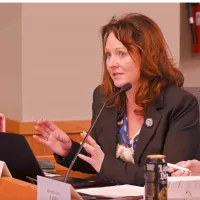
BY: ANNELISE HANSHAW
Missouri Independent
Missouri high school graduates may soon be able to attend career-certificate programs for free after state lawmakers passed a bill creating a reimbursement process for career and technical education.
The legislation now awaits Gov. Mike Kehoe’s signature or veto.
“This will increase (the workforce) astronomically,” said state Rep. Ann Kelley, a Republican from Lamar. “And it’s great for the kids who are in those career tech programs. It gives them another avenue to make themselves better.”
Kelley, who filed the bill in the House, told The Independent that she got the idea for the legislation after talking to a student. He was eligible for the state’s A+ Program, which pays for two years of public community college, and he wanted to use the funds to train for his commercial driver’s license.
But his goal of operating a dump truck business was derailed when he realized that the state’s program wouldn’t cover the type of education he needed.
So Kelley proposed a new program — one with eligibility requirements mirroring the A+ Program but to fund career-certificate programs.
To qualify, students will need to graduate high school with at least a 2.5 GPA, at least 95% attendance rate, 50 hours of unpaid tutoring and achieve proficiency in the Algebra I end-of-course exam. The Missouri Senate added another path to eligibility, opening the door to students with high school career-tech certificates.
“Currently a student who wants to obtain a certificate or license right out of high school… must pay for these out of pocket because the courses are too short to qualify for the A+ reimbursement program and are not Pell eligible,” Kelley said in a committee hearing in February. “These students are typically ones who are not interested in going to a two-year or four-year school.”
Some students use the state’s Fast Track Workforce Incentive Grant to pay for training and licensing, but the program requires participants to be at least 25 years old. Some students take jobs outside their career path to pass the time and avoid shelling out thousands for their certificate, Kelley said, but this legislation seeks to “fill the gap.”
To pay for the grants, the bill sets up a fund managed by the State Treasurer’s Office. Funding would have to be appropriated annually by the state’s general assembly, though the fund would also be open for donations.
The state estimates a cost of up to $3.3 mil in 2028, according to a fiscal note.
Kelley is “positive” that Kehoe will sign the bill given his vocal support for career-tech initiatives.
In his inaugural State of the State speech in January, Kehoe placed an emphasis on career and technical education and called for a work group to bolster CTE programs.
The legislation has also generated support from advocacy groups. In committee, lobbyists from the Missouri Chamber of Commerce and Industry and the Missouri National Education Association spoke in favor of the idea.
“Skilled technical talent is a major asset to Missouri employers across all industries,” the chamber of commerce’s lobbyist Cade Tremain said in a hearing in February.
The legislation received wide support, drawing just two “no” votes in the House and one in the Senate. It ultimately passed as part of a large higher education package with bipartisan support.



